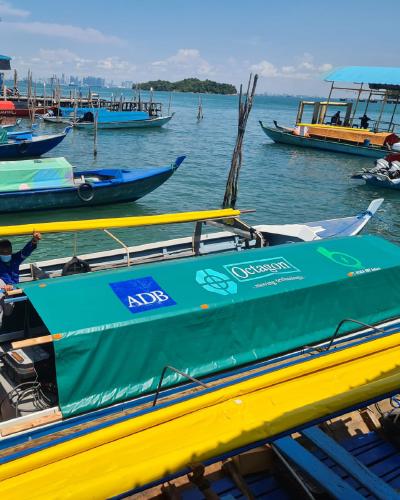In Asia and the Pacific, where transportation is deeply tied to economic and social development, outdated systems pose serious challenges. From worsening air pollution to road crashes and traffic congestion, the region is under pressure to evolve. To support this transition, the Asian Development Bank (ADB) and its partners are helping developing members chart a course toward transport systems that are greener, safer, and more efficient.
push for sustainable transport
Transport systems have a profound impact on social, environmental, and economic outcomes. Inefficient and outdated transport infrastructure and services can exacerbate air pollution, increase traffic crashes, and slow down economic growth. ADB’s developing member countries require assistance to mitigate these negative effects by creating sustainable, accessible, and safe transport systems.
Recognizing this need, ADB and its partners implemented a regional program that aims to promote sustainable transport in the region. Initially partnering with the Government of Austria with a funding of $1.5 million, the program expanded to over $9 million, bringing in more partners such as the Austria Fund, the Republic of Korea’s e-Asia and Knowledge Partnership Fund, the United Kingdom’s Foreign Commonwealth, and Development Office, and the Global Road Safety Facility.
fueling change
The program supported a wide range of country-led initiatives, from intelligent transport systems in the People’s Republic of China to a green transport action plan for Malaysia and an e-bus loan for the Kyrgyz Republic. In Southeast Asia, it supported the pilot testing of electric boats to explore low-carbon transportation models, which led to higher awareness of e-mobility and, indirectly, downstream investment projects focused on e-mobility.
But the program also went beyond infrastructure. It focused on strengthening institutions through training, technical assistance, and knowledge sharing. These brought together policymakers, transport experts, and practitioners to learn, exchange ideas, and innovate.
A standout feature was the program’s focus on Railway Asset Management (RAM), a critical step in shifting more transport from roads to rails to reduce congestion and emissions.
The ADB Transport Forum has become the largest platform in the region for sharing insights on urban mobility, road safety, and transport decarbonization.
empowering e-mobility transitions
A major success was the program’s pioneering work on e-mobility, which has become increasingly vital as cities grapple with the challenge of greenhouse gas emissions and poor air quality. ADB and its partners helped 23 cities develop strategies for cleaner urban transport. Two received intensive support to develop comprehensive e-mobility frameworks.
Countries like Thailand explored electric ferries, while officials in the Kyrgyz Republic were trained in setting up and managing an e-bus fleet. These efforts showed how e-mobility could work in different contexts—from island communities to sprawling capitals.
safer streets for all
Transport transformation is not just about vehicles—it is also about saving lives. The program championed key road safety initiatives like the Pakistan Road Assessment Program, which helped identify and address high-risk road sections using data-driven safety assessments to guide infrastructure improvements and reduce traffic-related injuries and fatalities.
In Ulaanbaatar, Mongolia, a road safety pilot helped protect schoolchildren through a practical tool kit for schools to address road safety challenges. The tool kit was later adopted for use in a broader ADB project on improving transport services in ger areas.
To sustain these gains, the Asia-Pacific Road Safety Observatory was established to track and analyze road safety data to inform policies that reduce traffic accidents and fatalities.
on the road to success
The program’s comprehensive approach to sustainable transport has led to tangible outcomes, including reduced greenhouse gas emissions, improved road safety, and enhanced capacity for sustainable transport planning among developing members. The successful implementation of e-mobility solutions demonstrated their feasibility in diverse environments. In parallel, road safety interventions contributed to a reduction in traffic-related fatalities and serious injuries, while capacity-building initiatives empowered local governments to develop and implement innovative transport strategies.
The continued support from funding partners has laid the groundwork for further sustainable transport initiatives, with lessons learned being integrated into subsequent programs to accelerate transport innovation across Asia and the Pacific.
From railways to e-buses, what began as pilot projects are now shaping the region’s next generation of transport: green, smart, and people-centered.
“Adopting cleaner transport solutions isn’t just a technical shift—it is a mindset shift as well. Improving road safety means changing behaviors as much as building safer roads.”


